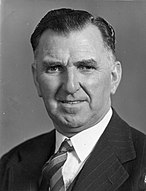New Zealand general election, 1951
|
|
|||||||||||||||||||||||||||||||||||||
|---|---|---|---|---|---|---|---|---|---|---|---|---|---|---|---|---|---|---|---|---|---|---|---|---|---|---|---|---|---|---|---|---|---|---|---|---|---|
|
|||||||||||||||||||||||||||||||||||||
|
|
|||||||||||||||||||||||||||||||||||||
|
All 80 seats in the New Zealand Parliament 41 seats were needed for a majority |
|||||||||||||||||||||||||||||||||||||
| Turnout | 1,069,791 (89.1%) | ||||||||||||||||||||||||||||||||||||
|
|||||||||||||||||||||||||||||||||||||
|
|||||||||||||||||||||||||||||||||||||
The 1951 New Zealand general election was a nationwide vote to determine the shape of the New Zealand Parliament's 30th term. The First National Government was re-elected, with the National Party increasing its lead over the opposition Labour Party.
The National Party had formed its first administration after the 1949 elections, in which it had ended four terms of government by the Labour Party. The National government, with Sidney Holland as Prime Minister, had undertaken a number of economic and constitutional reforms, although it had not seriously modified the new social welfare system which Labour had introduced. Labour's leader, Peter Fraser, had died in December 1950 after a long period of poor health, and had been replaced in January 1951 by Walter Nash. Nash had been Minister of Finance for the duration of the first Labour government.
The most significant issue in the 1951 elections was the growing industrial unrest of the time, particularly the ongoing dockworkers dispute. Holland condemned the strikers, calling the situation "industrial anarchy". The Labour Party, under Nash, attempted to take a moderate position in the dispute, but ended up displeasing both sides. Holland, seeking a mandate to respond strongly to the strike, called a snap election. Another issue was high inflation, which frustrated voters and without the strike, might have threatened Holland's government.
...
Wikipedia


